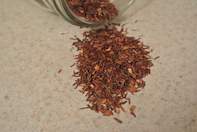
Rooibos production is centred around the optimal climate and soil requirements of the Western Cape and its various regions. Therefore, each area of production will produce a similar strain of tea, but it may differ in taste due to its position, flowering cycle or harvesting time.
A research team funded by the South African Rooibos Tea Council and based at South Africa’s Agricultural Research Council and Stellenbosch University, has developed a flavour and mouth-feel wheel with 27 descriptive attributes for Rooibos.
The 20 flavour and seven taste and mouth-feel descriptors were based on analysis of a large sample group and the wheel captures the sensory fingerprint of rooibos. This sensory wheel is a valuable tool to facilitate communication among Rooibos producers, processors, grading experts, marketers, flavour houses, importers and consumers.
To aid interpretation of the descriptors a preliminary sensory lexicon for some of the descriptors has also been developed. The sensory wheel and lexicon have created opportunities for niche products with specific flavours.
Rooibos is a popular product both locally and internationally, with great potential in a number of sectors, including food, health, beauty and skincare. Ingredients often added to rooibos include vanilla extract, aromatic spices, herbs, oils and fruits. It has even become a fun addition to alcoholic beverages such as gin and cocktail mixes.
 The caffeine-free rooibos tea of South Africa, also known as red tea, is reputed to have medicinal properties. Rooibos tea benefits include...
The caffeine-free rooibos tea of South Africa, also known as red tea, is reputed to have medicinal properties. Rooibos tea benefits include...